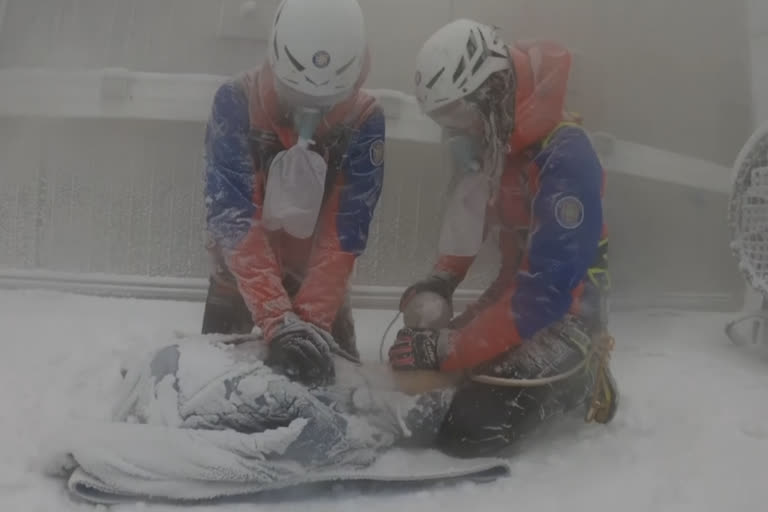Bolzano (Italy): Training in freezing cold, blizzard conditions isn't that easy. Once upon a time, mountain rescuers had to climb for hours or even days to practise emergency procedures. But now they can do it from the comfort of the terraXcube climactic chambers.
These are part of the Eurac Research Centre in the NOI tech park in Bolzano. Here climate conditions are technology controlled: from blizzards to dry heat waves, everything can be reproduced artificially.
"In these rooms, we can reproduce in a systemic and replicatable way environments that have extremely low temperatures from -40 degrees Celsius up to +60. And in terms of altitude we can go up to 9,000 meters," explains Christian Steurer who heads the Center.
"We can combine the wind, the snow, the rain, and all these conditions to create an extreme environment where we can put subjects that need to be analyzed," Steurer added.
Experiments of all kinds have been ongoing since terraXcube opened in April 2019. In this project, researchers are studying how changes in blood thickness increase its capacity to carry oxygen when humans ascend to high altitudes. Earlier studies investigating this mechanism had almost exclusively analysed male participants.
The highly controlled environment of the terraXcube can study high altitude acclimatization on women's blood as well. Private companies have also been taking advantage of the technology.
"We did some defrosting tests on big machines. These are cabins where people have to be inside, we defrosted them in a cold environment and the test was to understand how fast the glass of this cabin can be defrosted, the results were excellent for the client as well and we were able to demonstrate that this glass has a great performance," says Steurer, adding that the machinery made by the tractor cab makers Lochmann Cabine Srl is covered in frost. The room temperature is dropped to -20 degrees Celsius and its heating systems are tested for defrosting.
Several sensors also monitor how long it takes for the ambient temperature in the cab to reach 16 degrees. All of this is recorded by the chamber's video camera systems, providing clear data to the company.
TerraXcube was also a place to call home for Simone Moro and Tamara Lunger as they prepared for their failed attempt in early 2020 to ascend to the summit of Gasherbrum I and to Gasherbrum II. The two mountains are above 8,000 meters and part of the Karakorum chain in the Himalayas.
"They were acclimatized here in our room for about a month, they were slowly brought up to 7,000 meters of altitude," explains Steurer.
"The goal wasn't to train them or acclimatize them, we had scientific research going on, we monitored them with our researchers, our doctors, we checked their parameters, how they were doing and we were able to extract their data from this experiment. The goal is always to understand how man behaves scientifically in a process of acclimatization."
After studies on human behaviours and technology, terraXcube has now received national accreditation to carry out climate tests, not only on technology but also on biological organisms.
"In these rooms, we can accelerate time, or expose biological organisms, which can be plants, or even other small organisms, to extreme climate conditions," says Steurer.
"One example is that currently, plants grow at certain altitudes. With climate changes, these parameters change, and we can reproduce that artificially here in an accelerated way. So researchers can carry out these tests here and see the effects without having to go out, without putting themselves in danger and within in the amount of time they need."
He hopes the data they gather here will help humans learn how to care for the natural world a little better.
"I trust nature, sooner or later nature has always won. Man is finally understanding that extreme changes must be made to help nature be what we need it to be," says Steurer.
Eurac Research has more than 400 researchers working on issues that directly affect people's lives.
Understanding the impacts of climate change is probably the most important issue of all.
"We can at least contribute to saving the planet. It's true that we are late but I don't think it's too late so I think it's better that we now accelerate altogether, join our forces and that is at the end what we are doing here in this park, we are joining forces," says Vincent Mauroit, Director of Innovation and Tech Transfer, NOI Techpark Alto Adige.
NOI Techpark includes four university faculties, 40 private companies, 30 start-ups and 40 scientific laboratories.
AP



